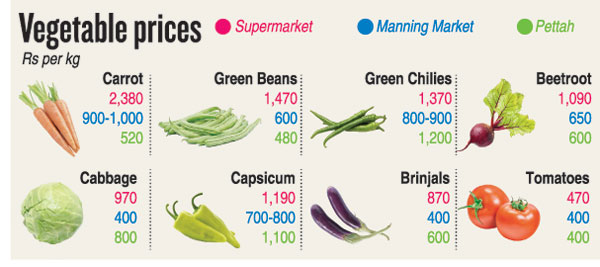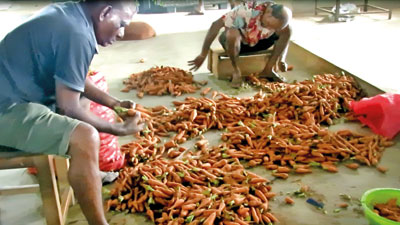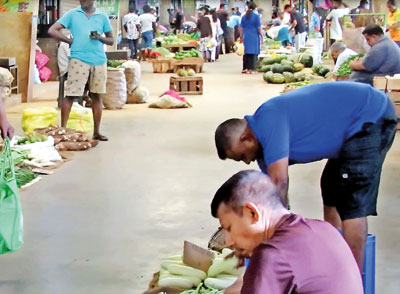News
Despite slight drop in prices, consumers find veggie tags hard to swallow
View(s):
Pettah market: A combination of farmers losing their crops and others refraining from producing crops due to the bad weather a major contributing factor to price hike and low supply
By Dilushi Wijesinghe
Dwindling consumer demands for high-priced vegetables are driving down prices, yet many consumers say the retail prices are still unaffordable.
Nearly four months of continuous rain have destroyed crops in the country’s vegetable basket in the central hills and the North Central Province, triggering a supply shortage coupled with an unprecedented rise in vegetable prices.
Peradeniya University Crop Science professor Buddhi Marambe said the prices would remain high for a few more months until stability returned to the market in time for the national new year in April.

Prof. Buddhi Marambe
He said a combination of some farmers completely losing their crops while others refrained from producing crops due to unexpected showers this season was a major contributing factor to the price hike and the low supply.
“During the end of last year, Nuwara Eliya alone experienced showers of more than 40 mm for 25 days running. Incessant rains and cloudy skies that block sunlight needed for photosynthesis caused the district’s productivity to drop to near zero, thus triggering a record price hike,” the professor said.
Farmers were severely affected by the rains. They had invested large sums, expecting a good harvest for the festive season. However, the results were disappointing.

Chamara Prasad
Chamara Prasad, a farmer in Boralanda, Welimada, spent nearly Rs. 70,000 to buy 350 kilos of seed potatoes and prepare the plots. “I expected a harvest of 3,500 kilos, but due to heavy rains, I got only 750 kilos,” he said.
Heavy rains have also forced some farmers to harvest crops prematurely, contributing to the lack of consumer demand. “We can’t sell our harvest because it lacks quality,” Prasad said.
Prof. Marambe said that due to these factors and the dealers wanting to sell the produce quickly while prices were high, there had been a shortage of vegetables amidst a high demand.
H.M. Karunarathne, the president of the Joint Farmers’ Association of the Ambewela Irrigation Scheme, pointed out that to offset the drop in the harvest and income, some farmers resorted to using Jackfruit for their own consumption.
He also pointed out that hill country farmers cultivated vegetables largely during the wet season, and during the dry season, they worked as labourers in other parts of the country, including Colombo, to earn a living. This has resulted in nearly 50% of cultivation land being abandoned.
Moreover, the presence of several players in the food system chain, beginning from the farmer to the middleman, transporter, wholesaler, retailer, and finally the consumer, with their added costs, has fuelled the price increase, restricting consumers from having easy access to agriculture produce at affordable prices.

H.M. Karunarathne
While some suspected that dealers held back stock to create an artificial demand hike, Prof. Marambe said it was not practical given the current circumstances, as dealers might require large-scale storerooms to store the produce that rotted fast. He said the demand for vegetables would remain despite high prices as long as the produce was made available on time.
“Unless we try to have mechanisms to store vegetables properly and release them to the market, price fluctuations at different times will be a continuing problem,” Prof. Marambe said, emphasising the importance of vegetable storage of a higher standard to avoid wastage.
Although there is a slight drop in vegetable prices, the prices of vegetables, which are usually in less demand, were also high. Sweet potatoes were selling for Rs 340 a kilogram and ash plantains for Rs 410 a kilogram at supermarkets. Notably, vegetable prices in supermarkets contrasted with market retail prices.
Agriculture Minister Mahinda Amaraweera’s solution to the problem of skyrocketing vegetable prices is for the people to grow their own vegetables. “We saw this coming when heavy rains began. I have told people to plant whatever they can in a pot,” was his response. “If you had planted a Kathurumuunga tree, brinjal, or chilli, you could have faced the issue well,” he said.
Education Minister Susil Premajayantha also proposed a solution by comparing the country to Western countries and saying, “Even citizens in flats or apartments grow vegetables in pots on their balconies.” He also advised universities to begin cultivation wherever possible.
Additional reporting by K.R. Rajamanthree



A few customers, less vegetables: Scenes at Manning market. Pix by Priyanka Samaraweera
The best way to say that you found the home of your dreams is by finding it on Hitad.lk. We have listings for apartments for sale or rent in Sri Lanka, no matter what locale you're looking for! Whether you live in Colombo, Galle, Kandy, Matara, Jaffna and more - we've got them all!

